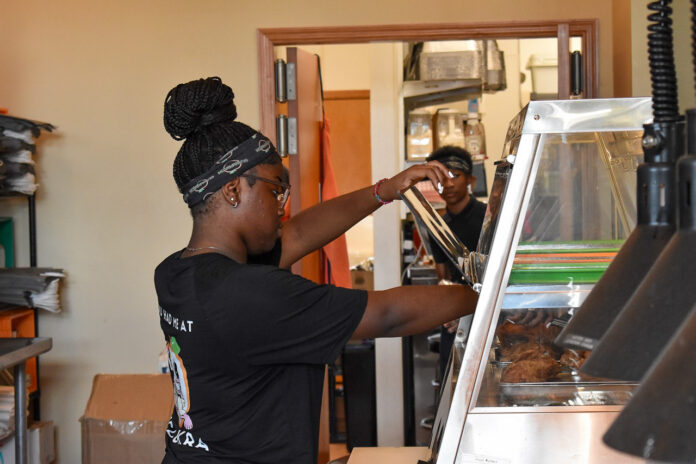
An Iowa bill meant to expand employment opportunities has backfired on the businesses it aimed to help, leaving many with exorbitant fines and teen employees open to potential exploitation. Last year, Iowa Governor Kim Reynolds passed Senate File 542, a bill relating to youth employment that repealed previous restrictions placed on hours and duties. Under […]
Want to Read More?
Get immediate, unlimited access to all subscriber content and much more.
Learn more in our subscriber FAQ.
- Unparalleled business coverage of the Iowa City / Cedar Rapids corridor.
- Immediate access to subscriber-only content on our website.
- 26 issues per year delivered digitally, in print or both.
- Support locally owned and operated journalism.
Do you want to read and share this article without a paywall?
Click here to purchase a paywall bypass linkAn Iowa bill meant to expand employment opportunities has backfired on the businesses it aimed to help, leaving many with exorbitant fines and teen employees open to potential exploitation.
Last year, Iowa Governor Kim Reynolds passed Senate File 542, a bill relating to youth employment that repealed previous restrictions placed on hours and duties.
Under the new law, 14 and 15-year olds can work until 9 p.m. during the school year and 11 p.m. during the summer, or a total of six hours per day or 28 hours per week when school is in session.
In comparison, federal law states these teens can work until 7 p.m. during the school year and 9 p.m. during the summer, or a total of three hours per school day and eight hours per non-school day; up to 18 hours per week during school weeks, and up to 40 hours per week during non-school weeks.
Additionally, SF 542 allows 16 and 17-year-olds to serve alcoholic beverages, as long as two employees 18 years of age or older are physically present. They can also participate in work activities declared “particularly hazardous” in a workplace learning situation, as long as it’s “incidental to training” or under “close supervision of a qualified and experienced person.”
Serving alcohol “puts young people at risk of sexual harassment, underage drinking, and other harms,” the Economic Policy Institute states of Iowa’s new law.
Local repercussions
In the midst of it all, a North Liberty restaurant has found itself in the fallout following the law’s enactment, facing a $65,000 fine that it can’t afford to pay.

Sugapeach Chicken & Fish Fry, 650 Pacha Pkwy., said many of the teens they employed were student athletes whose schedules they tried to work around, which meant they sometimes worked past the daily allotted amount.
“We realized that the state was trying to do something that was beneficial,” said owner Chad Simmons. “We realized that the Department of Labor was trying to make sure that things are beneficial for our youth. Our intention is that we appreciate that and we want that to happen, but the outcome is if the fine does come, that primarily is going to put us out of business, if we have to pay (it). And considering how we've gotten this far, for us, and then be put out of business for trying to do something that's good – it's challenging.”
Mr. Simmons and his wife, Carol Cater-Simmons, have owned and operated restaurants since 2012. After several iterations of their soul food restaurant concept, they opened Sugapeach Chicken & Fish Fry in North Liberty in 2016.
If the Department of Labor stands firm behind its fine, however, they may not be there for much longer – unless the state has something to say about it.
“Chad and Carol Simmons opened Sugapeach in August 2016 and employ teens not only to serve their customers, but also to support their community,” wrote Gov. Reynolds, in an open letter to the DOL’s acting secretary, Julie Su.
“The Simmons participate in the Scholars Making Dollars program coordinated by the local chapter of Alpha Phi Alpha, a historically Black fraternity. Its members mentor area youth, while local businesses like Sugapeach give them opportunities to develop work skills, gain real-world experience, and earn a paycheck. Sugapeach, like many small businesses, is a staple of its community and its potential closure, due to severe penalties imposed by the department, will have impacts well beyond its own doors,” the letter stated.
Double standard
When it comes to youth, the nation has a double standard, the governor said. Students are allowed to stay out late for extra-curricular activities but not if it means earning a paycheck.
“Iowans are known for our incredible work ethic, and we wanted to instill that in the next generation while providing them opportunities to develop new skills and earn a paycheck,” Gov. Reynolds wrote in an email to the CBJ. “The legislation is common-sense. Many teens are often participating in athletics, performance practices, and academic organizations well past 7:00 or 9:00 pm, yet for those who choose to work, the federal government limits their opportunities.”

It’s a sentiment echoed by Jessica Dunker, president and CEO of the Iowa Restaurant Association, which lobbied heavily for the bill.
“I think that they (DOL) are out of step with both the parents (and) the desires of the teen workers,” she said. “There's nothing unsafe about scooping an ice cream at 7:30 p.m. that's any more unsafe than it was scooping ice cream at 6:30 p.m. They're flexing their muscles, and showing us they can.”
The governor had planned to hold a press conference at Sugapeach on June 25 to “highlight the U.S. Department of Labor’s excessive penalties against Iowa businesses that employ teens,” but it was canceled when catastrophic flooding occurred in other parts of the state, pulling her focus elsewhere.
The Iowa Federation of Labor (IFL) planned a rebuttal press conference for the same day, but canceled when the governor’s event fell through. Instead, they hosted a separate event on July 16 in Cedar Rapids, where multiple labor leaders discussed how the current laws will negatively impact the health and well-being of minors in the workplace.
“We really can’t characterize this as anything other than a crisis,” said Jennifer Sherer, director of the State Worker Power Initiative with the Economic Policy Institute, at July’s event.
Child labor violations going up
Since 2019, child labor violations have increased 88%, according to the U.S. Department of Labor, (DOL), which has assessed more than $8 million in penalties since that time.
In Iowa alone, youth are working past the alloted, allowable hours during the school year and operating in hazardous conditions under the guise of work-based learning programs, as reported by the Gazette's Tom Barton.
However, Gov. Reynolds asserts that Iowa, above other states, is being unfairly singled out by the DOL.
“The targeting of Iowa businesses with excessive fines is absurd. 20 other states have less restrictive rules than the federal government, yet Iowa businesses are being targeted,” the governor wrote in an email. “And this isn't new, Iowa has been less restrictive than the federal rules since 1970. Many of these businesses will be forced to close because they cannot afford fines ranging up to $180,000. This is not about federal law versus state law, this is about people’s livelihoods. The congressional delegation and I are pushing back, asking the Department of Labor to reconsider these fines. Our asks are falling on deaf ears with the Biden Administration.”
This simply isn’t so, the DOL asserts.
“Increases in found child labor violations are not unique to Iowa,” a spokesperson from the DOL said. The department found child labor violations in 16 other states this year, spanning the entire nation, from California to New Hampshire.
Correspondence between the state and the DOL prior to SF 542’s passing suggest that Iowa was well aware the bill went against federal law. Prior to passing it into legislation, Iowa reached out to the DOL for technical assistance on the potential relationship between the bill and the child labor provisions of the Fair Labor Standards Act (FLSA).
“When Iowa legislators reached out to the Department of Labor regarding Senate File 542, the department made it abundantly clear that the bill is inconsistent with federal child labor law in several respects and promised to vigorously enforce federal child labor protections across the nation,” the DOL spokesperson said. “It’s dangerous and irresponsible that amidst a rise in child labor violations that Iowa’s governor and state legislature have chosen to repeatedly undermine federal child labor protections despite the Labor Department’s clear guidance.”
Last year, the DOL sent two letters to the Iowa legislature in the span of three months, raising concerns about the proposed legislation and its potential ramifications.
“Based on the information provided in your letter, the proposed Iowa legislation appears to be inconsistent with federal child labor law in several respects,” a letter dated May 10, 2023, states, in response to a query from Sen. Nate Boulton, D-Des Moines.
The DOL issued another letter after SF 542 passed, stating that “FLSA-covered employers that violate federal child labor law are subject to various penalties, including civil money penalties, which depend on the nature of the violations and the underlying factual circumstances…the Department will continue to monitor Iowa’s implementation of the law to assess potential obstruction of federal child labor protections.”
Lobbying groups knew it would violate federal regulations
In addition to the Iowa Restaurant Association, the Iowa Workforce Development Board led the effort to relax child labor regulations in Iowa, as uncovered in an investigation by More Perfect Union. It found that lobbyists for the Iowa Grocery Industry Association, Association of Iowa Builders, Iowa Hotel & Lodging Association, National Bureau of Independent Businesses, and the Iowa Association of Business and Industry (ABI) all pushed for the bill.
Ms. Dunker said the organization lobbied for the bill because it liked the fact that it extended work hours for 14 and 15-year-olds and allowed 16 and 17-year-olds to bring alcoholic beverages to tables, a provision that had “heavy guardrails in place,” she said.
A provision that was later removed would also allow students with school permits to drive themselves up to 50 miles to and from work between 5:00 a.m. and 10:00 p.m, another aspect the association thought beneficial.
“From the beginning, we knew that the law was out of compliance with the federal law, and from the beginning, (we) told people that we did not know how the federal government would respond,” she said. Disappointing, she noted, is that Iowa restaurants have not been treated the same way that restaurants in other states have been treated.
“If you go and look at the Department of Labor's own website, they list all of the states’ non-agricultural, youth employment rules, and we're the 20th state to be somewhere outside of the guidelines of their federal rules. Yet we're the only state (in which) the restaurants are facing fines that, quite frankly, will put them out of business,” she continued, but said that the association has no regrets about lobbying for the bill.
“I regret believing that the federal government treats all 50 states the same,” she said, in response to whether or not the association regrets lobbying for the bill. “I don't regret joining 19 other states and expanding work opportunities for high school students.”
In the past three years, at least 10 states have introduced or passed laws rolling back child labor protections, according to the Economic Policy Institute. Besides Iowa, these include Arkansas, Minnesota, Missouri, Nebraska, New Hampshire, New Jersey, Ohio, South Dakota and Wisconsin.
Most of them extend allowable work hours, but some eliminate work certificates, age verification, parent/guardian work requests, and allow hazardous work. Iowa, by far, has the most extreme legislation yet, Ms. Sherer said.
“We want to see kids no matter what their background is, have access to some basic level of education and safe work,” she said, at IFL's meeting last month. Studies show that academics are affected when teens work past 20 hours a week during the school year, she added.
Sugapeach had a visit from the DOL last August, Mr. Simmons said, which pointed out to him that teens can only work until 7 p.m. He “immediately” made adjustments and changes to teen employees’ working hours but was surprised to see how much the fine was.
Some of the teen employees’ duties included working the cash register, mopping, cleaning, and dishing food onto a plate, he said. If the restaurant was slow, the teens sat in the back of the store and studied or did homework. Cooking was never part of their duty, he said.
Who foots the bill?

Sugapeach has appealed their fine and said the Iowa Restaurant Association and the governor’s office have been “very supportive” so far.
“Our approach was just that, we wanted them both to know and see what they could do,” said Mr. Simmons, in regards to whether or not both parties could offer some relief for the fines. He said the state told them it would try to stay the fine with the DOL.
The governor declined to answer whether or not the state would help Iowa businesses pay their fines, and the Iowa Restaurant Association asserted that its organization would not be financially aiding affected businesses.
Sugapeach has also reached out to vice president Kamala Harris, citing a relationship developed during her 2019 visit, in hopes that she might advocate for Iowa businesses on a federal platform. Additionally, they plan on sending letters to other affected restaurants to see if they can come up with some solutions together.
“We believe it'd be appropriate for it to be a learning experience for all of us versus it to be punitive,” Mr. Simmons said of the experience.
“We just want to bring awareness (that) we think that this is a valid fight between the State and the Department of Labor,” he added. “But we don't believe that we, as innocent bystanders, should be impacted because it's a disagreement between them.”
If their request for an appeal is denied, the Simmons will liquidate and close the business.
“We appreciate everyone's good intentions,” Mr. Simmons said. “But we also understand that the laws don't necessarily meet the needs of the business community, and every staff member. We're a small business, we're trying to do good. We make mistakes, but it shouldn't be a death sentence. And that's what it feels like now – it's more of a death sentence…we just want them to fix it.”




